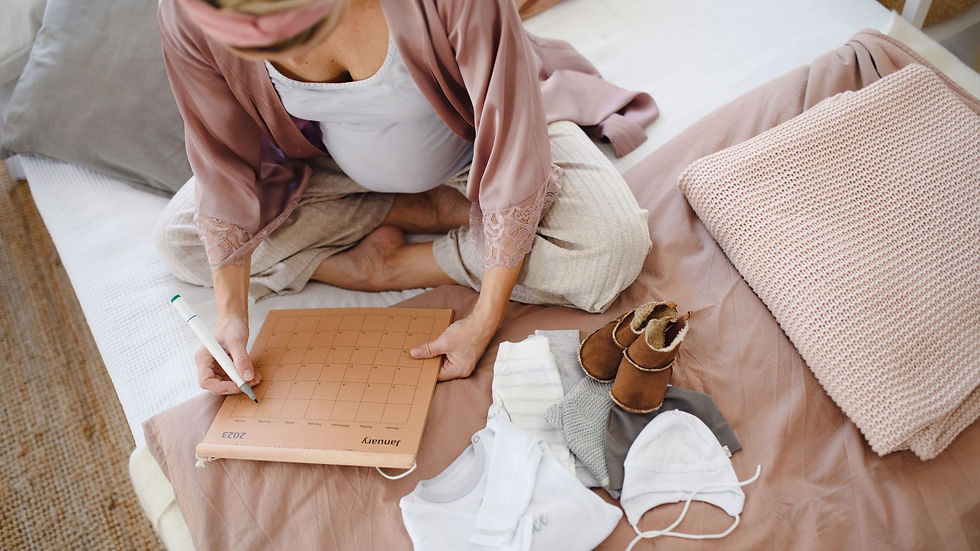How tracking 10 fetal movements a day can save you and your baby’s life
- Clara O'Rourke

- Apr 4, 2023
- 3 min read

During the third trimester of pregnancy, keeping track of fetal movements is important to ensure the baby is healthy and developing properly. Fetal movements are an essential indicator of fetal well-being, and changes in the frequency or intensity of movements can be a sign of potential problems. Tracking fetal movements helps expectant parents learn what’s normal for their baby and speak up if they notice a change.
What are fetal movements?
Fetal movements are any movements made by the fetus inside the uterus. These movements can include kicks, punches, rolls, and hiccups. Fetal movements are essential indicators of fetal well-being, and they can help healthcare providers detect any potential problems early on.
Why is it important to track fetal movements in the third trimester?
In the third trimester, fetal movements become more frequent and stronger. Tracking these movements can help detect decreased fetal movement, which can indicate fetal distress. In addition, tracking fetal movements can help pregnant people bond with their babies and provide a sense of reassurance and comfort.

Research out of Norway found a 30% reduction in stillbirth rate by teaching pregnant people how to monitor fetal movement during the third trimester by counting kicks daily. The Count the Kicks Campaign in Iowa noted a 32% decrease in stillbirth rates in the state over 10 years while the rest of the US remained stagnant. It’s clear that counting the kicks greatly impacts the well-being of babies and birthing people.
Just think, when we get sick, we become lethargic and don’t move as much. The same is true of our babies. Speaking up about changes in fetal movement can help expectant parents get the care they need. Having a record and tracking these movements increases the chances of your concerns being heard. Unfortunately, we are navigating an imperfect medical system which means having the data to back up the patterns we notice can be what helps us get the care we need.
How can fetal movements be tracked?
Start counting kicks at 28 weeks (26 weeks if considered high-risk). Sit with your feet up or lay on your side. There are several ways to track fetal movements, including:
Kick counts: Keep track of how long it takes your baby to reach ten movements. You can start a timer and record how long it takes you to feel ten movements. It’s best to pick a time of day that baby is active and monitor movements and record this around the same time each day. This will allow you to compare your sessions over time.
Apps: There are many apps available that can help pregnant people track fetal movements. These apps can be a helpful reminder to track the baby's movements and document a more precise record of the moments to share with your healthcare team if you are concerned about notable changes. I recommend downloading the free Count the Kicks App and beginning tracking once you reach your third trimester. This app also allows you to track the strength of the movements and take notes, and it’s available in 12 languages.

When should a healthcare provider be contacted?
If you notice a decrease in fetal movement or any other changes in your baby's movements, you should contact your healthcare provider immediately. Decreased fetal movement can indicate fetal distress and require prompt attention.
Tracking fetal movements during the third trimester is an important aspect of prenatal care. Pregnant people can keep track of fetal movements and ensure their babies are healthy and developing properly. If you notice a difference in the amount of time it takes for your baby to reach ten movements, and if any changes or decreased movements are noticed, it is important to contact a healthcare provider immediately.
Disclaimer
This information is for educational purposes only and is not meant for diagnosis or treatment. Use of this information should be done in accordance with your healthcare provider.

a free gift for you!
Ease your labor pains naturally without asking for an epidural.
Meet the Author

Clara O'Rourke (she hers),
Holistic Doula & Childbirth Educator.
I am a researcher turned total birth nerd with a passion for supporting people birth in their full power! I guide people through their pregnancy, labor, and postpartum journey by helping them overcome fear or anxiety about birth, providing evidence-based information so they can make informed decisions, and ensuring they have everything they need to birth with confidence. Birth is sacred and it should be treated that way. I am committed to providing support for birth and beyond, regardless of a person's background, sexual orientation, gender identity or expression, or relationship status. También ofrezco mis servicios en español. I wish you and your growing family the brightest of beginnings!




Comments